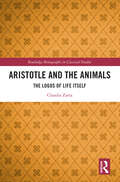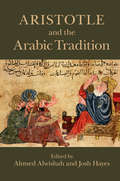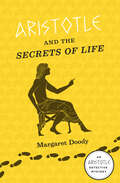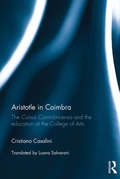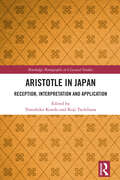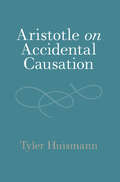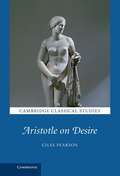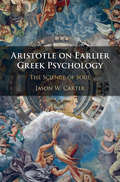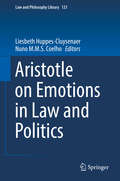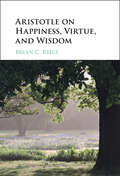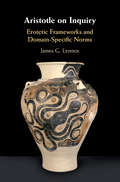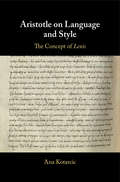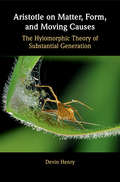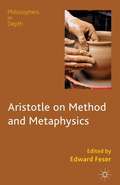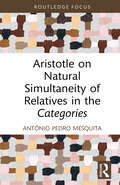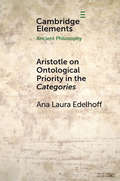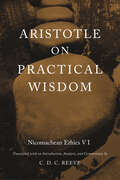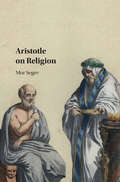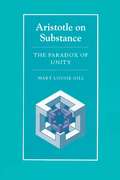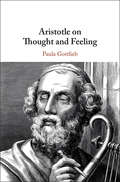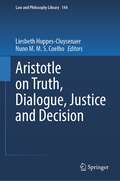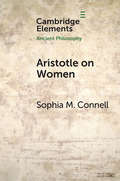- Table View
- List View
Aristotle and the Animals: The Logos of Life Itself (Routledge Monographs in Classical Studies)
by Claudia ZattaWith a novel approach to Aristotle’s zoology, this study looks at animals as creatures of nature (physis) and reveals a scientific discourse that, in response to his predecessors, exiles logos as reason and pursues the logos intrinsic to animals’ bodies, empowering them to sense the world and live. The volume explores Aristotle’s conception of animals through a discussion of his ad hoc methodology to study them, including the pertinence of the soul to such a study, and the rise of zoology as a branch of natural philosophy. For Aristotle, animal life stems from the body in the space of existence and revolves around sensation, which is entwined with pleasure, pain, and desire. Lack of human reason is irrelevant to an understanding of the richness of animal life and cognition. In sum, the reader will acquire knowledge of the "animal as such," which lay at the core of Aristotle’s agenda and required a study of its own, separate from plants and the elements. This book is intended for students of the history of science, ancient biology, and philosophy and all those who, from different fields, are interested in animal studies and the human-animal relation.
Aristotle and the Arabic Tradition
by Ahmed Alwishah Josh HayesThis volume of essays by scholars in ancient Greek, medieval, and Arabic philosophy examines the full range of Aristotle's influence upon the Arabic tradition. It explores central themes from Aristotle's corpus, including logic, rhetoric and poetics, physics and meteorology, psychology, metaphysics, ethics and politics, and examines how these themes are investigated and developed by Arabic philosophers including al-Kindî, al-Fârâbî, Avicenna, al-Ghazâlî, Ibn Bâjja and Averroes. The volume also includes essays which explicitly focus upon the historical reception of Aristotle, from the time of the Greek and Syriac transmission of his texts into the Islamic world to the period of their integration and assimilation into Arabic philosophy. This rich and wide-ranging collection will appeal to all those who are interested in the themes, development and context of Aristotle's enduring legacy within the Arabic tradition.
Aristotle and the Secrets of Life: An Aristotle Detective Novel (The Aristotle Detective Novels #3)
by Margaret DoodyThe great philosopher and his student face pirates, political intrigue, and more in this dark, suspenseful mystery set in ancient Athens. Tensions between the Athenians and the Makedonians—whose leader, Alexander the Great, is one of Aristotle&’s former students—draw the philosopher across the Aegean Sea, accompanied by the devoted Stephanos. Both will have much to learn about survival as they find themselves beset by pirates, uncovering conspiracy, and facing the horrors of war. It will be up to Aristotle to try to shed light on the darkness they are about to encounter—in this novel in the historical series praised as &“unusually authentic&” (Kirkus Reviews) and &“eminently enjoyable&” (Colin Dexter, author of the Inspector Morse Mysteries). Also published as Aristotle and the Mystery of Life
Aristotle in Coimbra: The Cursus Conimbricensis and the education at the College of Arts
by Cristiano CasaliniAristotle in Coimbra is the first book to cover the history of both the College of Arts in Coimbra and its most remarkable cultural product, the Cursus Conimbricensis, examining early Jesuit pedagogy as performed in one of the most important colleges run by the Society of Jesus in the sixteenth century. The first complete philosophical textbook published by a Jesuit college, the Cursus Conimbricensis (1592–1606) was created by some of the most renowned early Jesuit philosophers and comprised seven volumes of commentaries and disputations on Aristotle’s writings, which had formed the foundation of the university philosophy curriculum since the Middle Ages. In Aristotle in Coimbra, Cristiano Casalini demonstrates the connection between educational practices in a sixteenth-century college and the structure of a scholastic philosophical commentary, providing insight into this particular form of late-scholastic Aristotelianism through historiographical discourse. This book provides both a narrative of the historical background behind the publication of the Cursus and an analysis of the major philosophical and educational issues addressed by its seven volumes. It is valuable reading for all those interested in intellectual history, the history of education and the history of philosophy.
Aristotle in Japan: Reception, Interpretation and Application (Routledge Monographs in Classical Studies)
by Koji Tachibana Tomohiko KondoThis is the first volume to explore the modern reception and contemporary relevance of Aristotle and his philosophy in Japan, making it a valuable contribution to both global Aristotelian studies and studies of Japanese philosophical traditions.The study of Aristotle’s philosophy in Japan is already over a hundred years old, yet the fruits of these efforts have mostly been published in Japanese and thus circulated almost entirely within Japan. Japanese scholarship, however, has not been conducted in isolation but rather has developed by keeping up with crucial contemporary trends in international scholarship. Aristotelian studies in Japan have therefore been neither particularly Japanese nor Far East Asian at first glance, which is one reason why they have not received much attention in Japanese philosophical literature. This volume addresses this gap, exploring the long historical struggle of Japanese people to read, understand and adopt Aristotle’s philosophy in a philosophical tradition different from the West. It also examines the applicability of Aristotle’s philosophy to contemporary issues and demonstrates the extent to which his philosophy remains relevant today, whether in the East or West.Aristotle in Japan: Reception, Interpretation and Application is of interest to students and scholars of Aristotelian philosophy, as well as those working on Japanese philosophy and classical reception.
Aristotle on Accidental Causation
by Tyler HuismannIn this major new study, Tyler Huismann connects Aristotle's natural philosophy to modern theories of causation and provides fresh interpretations of classic issues. He links two of the most important notions in Aristotle's philosophy, accidents and causes, and using the concept of accidental causation as a guide, argues for ground-breaking proposals on some of the most foundational areas of Aristotle's thought: the relation between substances and accidents, the nature of efficient causation, the workings of 'qua,' the possibility of uncaused events, and the role of accidental causation in the natural world. Structured around close readings of Aristotle's Physics and Metaphysics and informed by contemporary theories of causation, Huismann's book offers students an accessible treatment of some of Aristotle's core texts, and provides specialists with a series of provocative interpretations.
Aristotle on Desire
by Giles PearsonDesire is a central concept in Aristotle's ethical and psychological works, but he does not provide us with a systematic treatment of the notion itself. This book reconstructs the account of desire latent in his various scattered remarks on the subject and analyses its role in his moral psychology. Topics include: the range of states that Aristotle counts as desires (orexeis); objects of desire (orekta) and the relation between desires and envisaging prospects; desire and the good; Aristotle's three species of desire: epithumia (pleasure-based desire), thumos (retaliatory desire) and boulêsis (good-based desire – in a narrower notion of 'good' than that which connects desire more generally to the good); Aristotle's division of desires into rational and non-rational; Aristotle and some current views on desire; and the role of desire in Aristotle's moral psychology. The book will be of relevance to anyone interested in Aristotle's ethics or psychology.
Aristotle on Earlier Greek Psychology: The Science of Soul
by Jason W. CarterThis volume is the first in English to provide a full, systematic investigation into Aristotle's criticisms of earlier Greek theories of the soul from the perspective of his theory of scientific explanation. Some interpreters of the De Anima have seen Aristotle's criticisms of Presocratic, Platonic, and other views about the soul as unfair or dialectical, but Jason W. Carter argues that Aristotle's criticisms are in fact a justified attempt to test the adequacy of earlier theories in terms of the theory of scientific knowledge he advances in the Posterior Analytics. Carter proposes a new interpretation of Aristotle's confrontations with earlier psychology, showing how his reception of other Greek philosophers shaped his own hylomorphic psychology and led him to adopt a novel dualist theory of the soul–body relation. His book will be important for students and scholars of Aristotle, ancient Greek psychology, and the history of the mind–body problem.
Aristotle on Emotions in Law and Politics (Law and Philosophy Library #121)
by Nuno M.M.S. Coelho Liesbeth Huppes-CluysenaerIn this book, experts from the fields of law and philosophy explore the works of Aristotle to illuminate the much-debated and fascinating relationship between emotions and justice.<P><P> Emotions matter in connection with democracy and equity – they are relevant to the judicial enforcement of rights, legal argumentation, and decision-making processes in legislative bodies and courts. The decisive role that emotions, feelings and passions play in these processes cannot be ignored – not even by those who believe that emotions have no legitimate place in the public sphere. A growing body of literature on these topics recognizes the seminal insights contributed by Aristotle. This book offers a comprehensive analysis of his thinking in this context, as well as proposals for inspiring dialogues between his works and those written by a selection of modern and contemporary thinkers. As such, the book offers a valuable resource for students of law, philosophy, rhetoric, politics, ethics and history, but also for readers interested in the ongoing debate about legal positivism and the relevance of emotions for legal and political life in today’s world. <P> Explains how Aristotle’s attention to the non-rational elements of cognition contributes to his realistic views on the rule of law, social cohesion, democracy and judgment.<P> Re-appraises Aristotle’s biological view on the continuity between human and animal life.<P> Shows the striking similarity between the views of contemporary neuro-scientists and Aristotle’s thoughts on emotion.<P> Examines many of Aristotle’s writings such as Nicomachean Ethics, Politics, Rhetoric and Metaphysics.<P> Presents the outcomes of several years of interdisciplinary collaboration between ancient philosophy scholars, legal theorists, political scientists and historians
Aristotle on Happiness, Virtue, and Wisdom
by Bryan C. ReeceAristotle thinks that happiness is an activity – it consists in doing something – rather than a feeling. It is the best activity of which humans are capable and is spread out over the course of a life. But what kind of activity is it? Some of his remarks indicate that it is a single best kind of activity, intellectual contemplation. Other evidence suggests that it is an overarching activity that has various virtuous activities, ethical and intellectual, as parts. Numerous interpreters have sharply disagreed about Aristotle's answers to such questions. In this book, Bryan Reece offers a fundamentally new approach to determining what kind of activity Aristotle thinks happiness is, one that challenges widespread assumptions that have until now prevented a dialectically satisfactory interpretation. His approach displays the boldness and systematicity of Aristotle's practical philosophy.
Aristotle on Homonymy
by Julie K. WardJulie K. Ward examines Aristotle's thought regarding how language informs our views of what is real. First she places Aristotle's theory in its historical and philosophical contexts in relation to Plato and Speusippus. Ward then explores Aristotle's theory of language as it is deployed in several works, including Ethics, Topics, Physics, and Metaphysics, so as to consider its relation to dialectical practice and scientific explanation as Aristotle conceived it.
Aristotle on Inquiry: Erotetic Frameworks and Domain-Specific Norms
by James G. LennoxAristotle is a rarity in the history of philosophy and science - he is a towering figure in the history of both disciplines. Moreover, he devoted a great deal of philosophical attention to the nature of scientific knowledge. How then do his philosophical reflections on scientific knowledge impact his actual scientific inquiries? In this book James Lennox sets out to answer this question. He argues that Aristotle has a richly normative view of scientific inquiry, and that those norms are of two kinds: a general, question-guided framework applicable to all scientific inquiries, and domain-specific norms reflecting differences in the target of inquiry and in the means of observation available to researchers. To see these norms of inquiry in action, the second half of this book examines Aristotle's investigations of animals, the soul, material compounds, the motions of heavenly bodies, and respiration.
Aristotle on Language and Style: The Concept of Lexis
by Ana KotarcicThis is the first systematic analysis of Aristotle's concept of lexis. Ana Kotarcic argues that it should be approached on three interconnected levels: the first dealing with language as a system, the second with actual language usage, into which sociolinguistic factors come into play, and the third with prescriptions for the kind of language to be used in poetic and rhetorical compositions. She introduces ideas and concepts from classics and modern linguistics into the analysis alongside the philosophical approaches which have prevailed until now. The results reveal that Aristotle's ideas on lexis are complex, well-developed and intimately connected to many other fundamental concepts in his works, such as aretē, energeia, ēthos, logos, mimēsis, pathos, phantasia and technē. A major component of his thought is therefore illuminated comprehensively for the first time.
Aristotle on Matter, Form, and Moving Causes: The Hylomorphic Theory of Substantial Generation
by Devin HenryThis book examines an important area of Aristotle's philosophy: the generation of substances. While other changes presuppose the existence of a substance (Socrates grows taller), substantial generation results in something genuinely new that did not exist before (Socrates himself). The central argument of this book is that Aristotle defends a 'hylomorphic' model of substantial generation. In its most complete formulation, this model says that substantial generation involves three principles: (1) matter, which is the subject from which the change proceeds; (2) form, which is the end towards which the process advances; and (3) an efficient cause, which directs the process towards that form. By examining the development of this model across Aristotle's works, Devin Henry seeks to deepen our grasp on how the doctrine of hylomorphism - understood as a blueprint for thinking about the world - informs our understanding of the process by which new substances come into being.
Aristotle on Method and Metaphysics
by Edward FeserAristotle on Method and Metaphysics is a collection of new and cutting-edge essays by prominent Aristotle scholars and Aristotelian philosophers on themes in ontology, causation, modality, essentialism, the metaphysics of life, natural theology, and scientific and philosophical methodology.
Aristotle on Natural Simultaneity of Relatives in the Categories (Routledge Focus on Philosophy)
by António Pedro MesquitaThis book addresses the issue of natural simultaneity of relatives, discussed by Aristotle in Categories 7, 7b15– 8a12. Natural simultaneity is a form of symmetrical ontological dependence that holds between items that are not causally linked. In this section of the Categories, Aristotle introduces this topic in his analysis of relatives and maintains that although relatives seem to be for the most part simultaneous by nature, there seem to be some exceptions. He mentions two pairs of relatives as exceptions, namely the pairs knowledge/knowable and perception/perceptible, and argues at length for the priority of the second relative over the first one in each case. Through a close reading of this text, the author analyses Aristotle’s arguments for the thesis of the exceptional character of these pairs and shows that all of them are unsuccessful in supporting the thesis. In order to draw this conclusion, the author highlights and carefully considers the properties that Aristotle is committed to attributing to relatives, taking into account the metaphysical framework of the Categories as well as their specificities within the set of nonsubstantial categories. Then, he shows that Aristotle’s mature views on relatives in the Metaphysics can be construed as committing him to the rejection of such a thesis.Although the issue of natural simultaneity is just one of several that Aristotle considers in his discussion of relatives throughout Categories 7, it is a particularly relevant issue, since it involves a number of puzzles whose analysis allows for a better understanding of the very notion of relativity in Aristotle. This is the first book to explore this issue from the perspective of illuminating the Aristotelian views on relatives.Aristotle on Natural Simultaneity of Relatives in the Categories will appeal to scholars and graduate students working on Aristotle, ancient philosophy in general, and metaphysics.
Aristotle on Ontological Priority in the Categories (Elements in Ancient Philosophy)
by Ana Laura EdelhoffThe main objective of this Element is to reconstruct Aristotle's view on the nature of ontological priority in the Categories. Over the last three decades, investigations into ontological dependence and priority have become a major concern in contemporary metaphysics. Many see Aristotle as the originator of these discussions and, as a consequence, there is considerable interest in his own account of ontological dependence. In light of the renewed interest in Aristotelian metaphysics, it will be worthwhile - both historically and systematically - to return to Aristotle himself and to see how he himself conceived of ontological priority (what he calls 'priority in substance' [proteron kata ousian] or 'priority in nature' [proteron tēi phusei]), which is to be understood as a form of asymmetric ontological dependence.
Aristotle on Political Community
by David J. RiesbeckAristotle's claims that 'man is a political animal' and that political community 'exists for the sake of living well' have frequently been celebrated by thinkers of divergent political persuasions. The details of his political philosophy, however, have often been regarded as outmoded, contradictory, or pernicious. This book takes on the major problems that arise in attempting to understand how the central pieces of Aristotle's political thought fit together: can a conception of politics that seems fundamentally inclusive and egalitarian be reconciled with a vision of justice that seems uncompromisingly hierarchical and authoritarian? Riesbeck argues that Aristotle's ideas about the distinctive nature and value of political community, political authority, and political participation are coherent and consistent with his aristocratic standards of justice. The result is a theory that, while not free of problems, remains a potentially fruitful resource for contemporary thinking about the persistent problems of political life.
Aristotle on Practical Wisdom: <i>Nicomachean Ethics</i> VI
by C. D. ReeveNicomachean Ethics VI is considered one of classical philosophy’s greatest achievements. Aristotle on Practical Wisdom is the first full-scale commentary on this work to be issued in over a century, and is the most comprehensive and philosophically illuminating to date. A meticulous translation coupled with facing-page analysis enables readers to engage directly with the account of phronêsis or practical wisdom that Aristotle is developing, while a full introduction locates that account in the context of his ethical thought and of later ethical thought more generally. The commentary discusses the text line by line, illuminating obscure passages, explaining technical ones, and providing a new overall interpretation of the work and the nature of practical reason.A companion volume, Action, Contemplation, and Happiness, expands on this interpretation to provide a startling new picture of Aristotle’s thought as a whole. Although the two books can be approached separately, together they constitute one of the most daring and original contemporary readings of Aristotle’s philosophy. Aimed at committed students of these notoriously difficult writings, C. D. C. Reeve’s engaging and lucid books should find a wide audience among philosophers, classicists, and all readers willing to wrestle with a thinker of unparalleled subtlety, depth, and scope.
Aristotle on Religion
by Mor SegevAristotle is a severe critic of traditional religion, believing it to be false, yet he also holds that traditional religion and its institutions are necessary if any city, including the ideal city he describes in the Politics, is to exist and flourish. This book provides, for the first time, a coherent account of the socio-political role which Aristotle attributes to traditional religion despite his rejection of its content. Mor Segev argues that Aristotle thinks traditional religion is politically necessary because it prepares the ground for what he considers the pinnacle of human endeavor: attaining the knowledge of first philosophy, whose objects are real beings worthy of being called gods. Developing this interpretation, Segev goes on to analyze Aristotle's references to the myths of traditional Greek religion, and to assess his influence on medieval Jewish and Christian theology and philosophy of religion.
Aristotle on Substance: The Paradox of Unity
by Mary Louise GillThis book explores a fundamental tension in Aristotle's metaphysics: how can an entity such as a living organisma composite generated through the imposition of form on preexisting matterhave the conceptual unity that Aristotle demands of primary substances? Mary Louise Gill bases her treatment of the problem of unity, and of Aristotle's solution, on a fresh interpretation of the relation between matter and form. Challenging the traditional understanding of Aristotelian matter, she argues that material substances are subverted by matter and maintained by form that controls the matter to serve a positive end. The unity of material substances thus involves a dynamic relation between resistant materials and directive ends. Aristotle on Substance offers both a general account of matter, form, and substantial unity and a specific assessment of particular Aristotelian arguments. At every point, Gill engages Aristotle on his own philosophical ground through the detailed analysis of central, and often controversial, texts from the Metaphysics, Physics, On Generation and Corruption, De Anima, De Caelo, and the biological works. The result is a coherent, firmly grounded rethinking of Aristotle's central metaphysical concepts and of his struggle toward a fully consistent theory of material substances.
Aristotle on Thought and Feeling
by Paula GottliebAristotle's discussion of the motivation of the good person is both complicated and cryptic. Depending on which passages are emphasized, he may seem to be presenting a Kantian style view according to which the good person is and ought to be motivated primarily by reason, or a Humean style view according to which desires and feelings are or ought to be in charge. In this book, Paula Gottlieb argues that Aristotle sees the thought, desires and feelings of the good person as interdependent in a way that is sui generis, and she explains how Aristotle's concept of choice (prohairesis) is an innovative and pivotal element in his account. Gottlieb's interpretation casts light on Aristotle's account of moral education, on the psychology of good, bad and half-bad (akratic) people, and on the aesthetic and even musical side to being a good person.
Aristotle on Time
by Tony RoarkAristotle's definition of time as 'a number of motion with respect to the before and after' has been branded as patently circular by commentators ranging from Simplicius to W. D. Ross. In this book Tony Roark presents an interpretation of the definition that renders it not only non-circular, but also worthy of serious philosophical scrutiny. He shows how Aristotle developed an account of the nature of time that is inspired by Plato while also thoroughly bound up with Aristotle's sophisticated analyses of motion and perception. When Aristotle's view is properly understood, Roark argues, it is immune to devastating objections against the possibility of temporal passage articulated by McTaggart and other 20th century philosophers. Roark's novel and fascinating interpretation of Aristotle's temporal theory will appeal to those interested in Aristotle, ancient philosophy and the philosophy of time.
Aristotle on Truth, Dialogue, Justice and Decision (Law and Philosophy Library #144)
by Liesbeth Huppes-Cluysenaer Nuno M. M. S. CoelhoIn this thought-provoking book, you’ll find timeless questions explored through a fresh lens. First delving into the profound significance of Socrates’ dialogical method and the inescapable nature of conflict, it ponders the rational capacities of humanity in terms of establishing harmonious communities. But this isn’t merely a philosophical debate; it’s a pragmatic exploration of real-world challenges.No longer limiting itself to abstract theories, the book then seeks to navigate the practical terrain of science and politics. Drawing inspiration from Aristotle, renowned for his investigations into the intricate connections between theory, technology, ethics, and politics, it tackles the essential question: How can we reconcile divergent views?At the book’s core lies Aristotle’s revolutionary concept of dialogue, which portrays truth as a delicate equilibrium between opposing forces, transcending the rigid boundaries of true and false. Join this captivating journey as the author reveals the hidden paths to meaningful coexistence in a world filled with conflicting perspectives.
Aristotle on Women: Physiology, Psychology, and Politics (Elements in Ancient Philosophy)
by Sophia M. ConnellThis Element provides an account of Aristotle on women which combines what is found in his scientific biology with his practical philosophy. Scholars have often debated how these two fields are related. The current study shows that according to Aristotelian biology, women are set up for intelligence and tend to be milder-tempered than men. Thus, women are not curtailed either intellectually or morally by their biology. The biological basis for the rule of men over women is women's lack of spiritedness. Aristotle's Politics must be read with its audience in mind; there is a need to convince men of the importance of avoiding insurrection both in the city and the household. While their spiritedness gives men the upper hand, they are encouraged to listen to the views of free women in order to achieve the best life for all.
